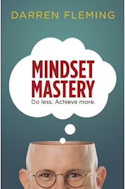Anouare Abdou* explains the key differences between having a growth mindset versus a fixed mindset, and how to change your habits.
 We all like to think that we are ambitious professionals with a growth mindset.
We all like to think that we are ambitious professionals with a growth mindset.
But it’s not as simple as that.
Dr Carol Dweck, a psychologist at Stanford University and the author of Mindset: The New Psychology of Success, popularised the concept of the growth mindset with her research on how people approach challenges.
She identified two core sets of beliefs: the fixed and the growth mindsets.
“Someone with a growth mindset believes that their talents, intelligence and abilities can be developed with effort,” says Sam Laura Brown, a mindset coach.
“Someone with a fixed mindset believes that their talents, intelligence and abilities are fixed and that effort is therefore a sign of inadequacy.”
Having a fixed mindset can hold you back, while embracing a growth mindset will lead to greater success and happiness.
And you could have a growth mindset in some areas of your life but not others or have a fixed mindset when triggered by certain circumstances without even realising it.
The key differences are sometimes subtle, but understanding them will help you take your own mindset to the next level.
- People with a growth mindset focus on effort
“This is important because it encourages us to show up, to be courageous and to try new things,” says Brown.
“The more we encourage ourselves, and others, to show up fully, the more we fully engage in life and the more we achieve.”
If you praise others for their wins but never think twice about encouraging them for making progress, you could be perpetuating a fixed mindset in your team.
Try highlighting your co-workers’ learnings or rewarding their willingness to try different strategies.
- People with a fixed mindset love being complimented for their intelligence or talent
As a student, did you pride yourself on your ability to get killer grades without studying?
This is a telltale sign of having a fixed mindset.
“Another subtle way someone might be in a fixed mindset is when they pride themselves, or compliment others, on being a ‘natural’ talent,” says Brown.
“As a society, we tend to praise others for their ‘natural’ abilities and yet this only perpetuates the fixed mindset.”
“People in a growth mindset pride themselves on their ability to learn and grow, to be courageous and to be resourceful.”
- People with a fixed mindset don’t deal well with failure
People with a growth mindset embody the popular saying “it’s better to try and fail than never to try at all,” according to Brown.
But those with a fixed mindset are so terrified of failure they would rather play it safe.
- People with a growth mindset love trying new things
Your enthusiasm for new challenges is a benchmark for your mindset.
“Someone in a growth mindset wants to take on new challenges,” says Brown.
“Someone in a fixed mindset wants to do things that they’re already good at.”
When it comes to career development, getting out of your comfort zone is crucial to accessing new opportunities.
“To cultivate a growth mindset, take a look at your life and identify one area that you enjoy putting effort into and don’t get deterred by temporary failure or setbacks,” says Brown.
“Notice how you think about this area of your life and apply that way of thinking to the area of your life in which you want to develop a growth mindset.”
- People with a fixed mindset tend to be results-oriented
“Someone in a fixed mindset is in a rush towards their goals because they need external validation that they’re smart and talented,” says Brown.
These people tend not to enjoy the journey.
“This is incredibly destructive as the journey is all we ever have, and no amount of praise ever satiates someone in a fixed mindset,” she says.
- People with a growth mindset embrace feedback
If you are the type of person who continuously seeks feedback to improve, you’ve understood a key part of having a growth mindset.
But if you tend to get crushed when someone gives you constructive feedback, you may be stuck in a fixed mindset loop.
“Someone in a growth mindset is excited by constructive feedback, as they see it as an opportunity for growth,” says Brown.
“Someone in a fixed mindset is deterred by constructive feedback, as they see it as evidence that they’re lacking natural ability and talent.”
- People with a fixed mindset take fewer risks
When is the last time you allowed yourself to really suck at something?
If you can’t remember, you could be playing small to protect yourself from the discomfort that comes with not being naturally good at a task from the get-go.
“People in a fixed mindset shrink their world so that they’re only doing things they’re already capable of doing,” says Brown.
“This means they deny themselves of opportunities for growth and opportunities to make a significant contribution to the world.”
If this sounds like you, don’t despair.
Cultivating a growth mindset takes practise and the first step is awareness.
“When most people hear about the growth mindset, they want to get into it immediately — but …it takes time and practise, especially since many of us have been in the fixed mindset for decades,” says Brown.
“First, you must spend some time understanding your current mindset.”
* Anouare Abdou is a management consultant, writer and career mentor.
This article first appeared at www.theladders.com/career-advice.











